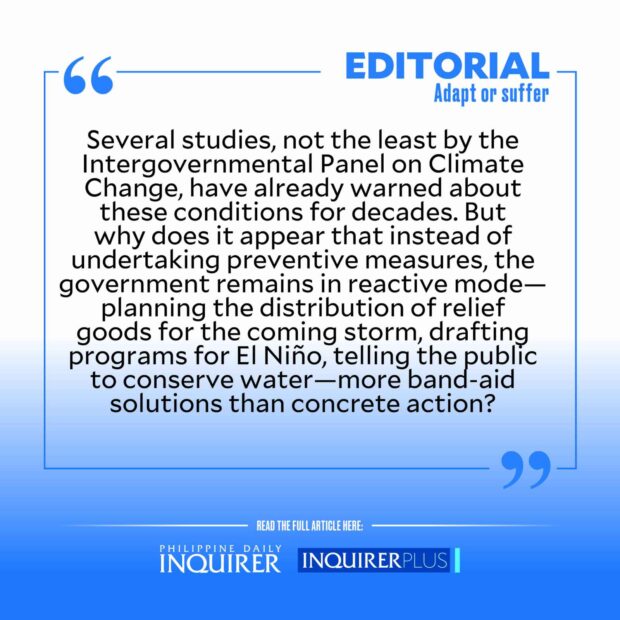Adapt or suffer

Remember the tale of the frog put in tepid water that is slowly brought to a boil? The frog did not perceive the danger and was cooked to death.
The extremely hot weather in the country, however, is no longer an amusing metaphor but a reality. Last Wednesday, the heat index hit 53°C in Occidental Mindoro, the highest recorded since March — cooler temperatures and heavy rains expected to be brought by super typhoon “Betty” this coming week notwithstanding. These extreme weather events that have become even more frequent and deadly are an indication of a rise in global temperature, and it’s the poor and marginalized Filipinos who always bear the brunt.
A recently published report by the World Meteorological Organization (WMO) said there is a 66-percent likelihood that global average temperature will breach the 1.5°C pre-industrial levels within the next five years. Over this period, WMO warned, at least one year will be the warmest on record.
Three weeks ago, the Philippine Atmospheric, Geophysical, and Astronomical Administration already issued an alert for El Niño, which is set to begin as early as June — that’s already this coming week. This weather pattern is expected to be felt until next year and will likely lead to even higher global temperatures.
This country of 7,600-plus islands already feels like hell at the peak of the dry season so imagine how, if temperatures soar even higher, it will be like for the regular commuter, the construction worker, the farmer, or just about any ordinary Filipino. On top of the impact on public health, extreme weather events affect our basic needs — water supply could be interrupted and food security could be at risk, pushing up the prices of agriculture and fisheries products, not to mention pushing more people into poverty and making poverty reduction even more challenging in the future.
This is neither the first time that El Niño will hit the Philippines nor are extreme weather events new to a country that has been identified as one of the most vulnerable.
Several studies, not the least by the Intergovernmental Panel on Climate Change, have already warned about these conditions for decades. Yet it would seem that the government still lacks the political will to implement long-term programs.
The Climate Change Commission said P453.1 billion has been allocated this year for climate change adaptation and mitigation programs including food security, water sufficiency, and knowledge and capacity development. But why does it appear that instead of undertaking preventive measures, the government remains in reactive mode — planning the distribution of relief goods for the coming storm, drafting programs for El Niño, telling the public to conserve water — more band-aid solutions than concrete action?
President Marcos recently said, “We must adapt, and if we don’t do that we must suffer.”
As it is, there are already reports of farm workers in the Soccsksargen region abandoning farms to look for alternative means of livelihood in neighboring areas. Could it be that they failed to adapt or were not given the proper assistance for adaptation?
At this time, the Department of Agriculture (DA) — still without a full-time secretary — should have already coordinated with local governments to help farmers, i.e., providing them with seeds for crops that can easily adapt to the dry spell, helping them innovate water management systems, and advising them on other alternatives.
The DA must ensure that despite the dry spell, farmers can continue production, and farmlands wouldn’t be left idle. And if the DA wants to spend millions on cloud seeding operations, it must ensure that this will not end up as another useless endeavor in the same way that it has insisted for years on giving assistance that farmers don’t need — for example, instead of providing them with carabaos to help till their lands, they give fertilizers and hybrid seeds that the farmers only end up selling. The last thing that the government wants to do at this point is to extend help that is meaningless, and which ends up wasting the country’s already limited resources.
The environmental nongovernmental organization Greenpeace last year criticized the government for lacking a holistic climate action strategy, noting that pronouncements of the climate crisis as a priority issue have not translated to meaningful action. More than stopgap measures, what those in the vulnerable sectors need are concrete, long-term solutions that would build their resiliency to the climate crisis: better infrastructure projects to prevent floods during the rainy season, ensure irrigation to farms during the dry season, provide poor families with sturdy shelter; agricultural and fisheries policies that protect the livelihood of farmers and fisherfolk through extreme weather conditions; reforestation; renewable energy; etc.
The government cannot let Filipinos be the proverbial frog on a rapidly warming planet, and leave them to their own devices to adapt — or suffer. It must look at long-term solutions to address the climate crisis—and implement them with more urgency.
















